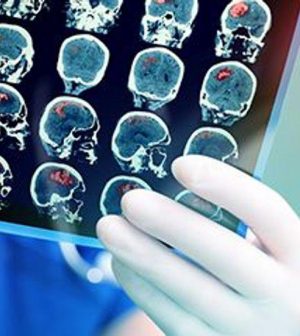- Could Your Grocery Store Meat Be Causing Recurring UTIs?
- Are You Making This Expensive Thermostat Error This Winter?
- Recognizing the Signs of Hypothyroidism
- 10 Strategies to Overcome Insomnia
- Could Artificial Sweeteners Be Aging the Brain Faster?
- Techniques for Soothing Your Nervous System
- Does the Water in Your House Smell Funny? Here’s Why
- Can a Daily Dose of Apple Cider Vinegar Actually Aid Weight Loss?
- 6 Health Beverages That Can Actually Spike Your Blood Sugar
- Treatment Options for Social Anxiety Disorder
Scans Show Brain Changes in People With Long COVID

People with long COVID exhibit brain changes that are different from the brains of fully recovered COVID-19 patients, a new brain scan study reports.
COVID-19 induced a specific pattern of microscopic structural changes in various brain regions of people with long COVID, researchers will report at the upcoming annual meeting of the Radiological Society of North America (RSNA).
“To the best of our knowledge, this is the first study comparing patients with long COVID to both a group without history of COVID-19 and a group that went through a COVID-19 infection but is subjectively unimpaired,” lead researcher Dr. Alexander Rau, a neuroradiology resident at University Hospital Freiburg in Freiburg, Germany, said in an RSNA news release.
Between 10% and 25% of patients with a COVID infection wind up developing long COVID, researchers estimate.
Long COVID involves a collection of different symptoms that can last for weeks, months or even years after a person gets over their initial illness, according to the Cleveland Clinic.
Symptoms can include “brain fog,” fatigue, joint or muscle pain, shortness of breath, GI disturbances, heart palpitations, and changes in sense of smell or taste.
For this study, researchers scanned participants’ brains using a novel MRI technique that analyzes the movement of water molecules in tissues. This method can provide detailed information on the brain’s microstructure, and can detect even very small changes in the brain.
The people scanned include 89 patients with long COVID, 38 patients who’d recovered fully from a COVID infection, and 46 healthy folks with no COVID history.
Researchers didn’t find any loss of brain volume or lesions that might explain long COVID symptoms.
But they did find tiny changes in various brain regions that differed between people with long COVID and those who’d recovered fully, results show.
They specifically found an association between these microstructural changes and brain networks specific to the symptoms of brain fog, fatigue and sense of smell.
“Expression of post-COVID symptoms was associated with specific affected cerebral networks, suggesting a pathophysiological basis of this syndrome,” Rau said.
Researchers hope to re-examine the patients in the future to see if their clinical symptoms change, and if those changes can be related to brain structure.
The RSNA meeting is Sunday through Thursday in Chicago.
Findings presented at medical meetings should be considered preliminary until published in a peer-reviewed journal.
More information
The Cleveland Clinic has more about long COVID.
SOURCE: Radiological Society of North America, news release, Nov. 22, 2023
What This Means For You
People with long COVID might have brain changes that are causing their extended symptoms.
Source: HealthDay
Copyright © 2026 HealthDay. All rights reserved.










